Is It Too Late for Dental Implants If I’ve Worn Dentures for 17 Years?
Is it too late for dental implants if I’ve worn dentures for 17 years? What can I expect from the procedure? Thanks. Lucas
Lucas,
Wearing dentures for years will not prevent you from getting implant dentures.
Can You Get Dentures After Wearing Dental Implants for Years?
You can get dental implants after wearing dentures for decades. However, the longer you wear dentures, the more complex your dental implant procedure will become. When all your teeth are missing, they can no longer stimulate and preserve your jawbone. As the jawbone shrinks, your facial muscles will begin to sag.
Getting dental implants often requires bone grafting procedures to ensure they have enough support. Your dentist or oral surgeon may use bone harvested from your body, such as the hip, or the dentist may recommend donor, bovine, or artificial bone.
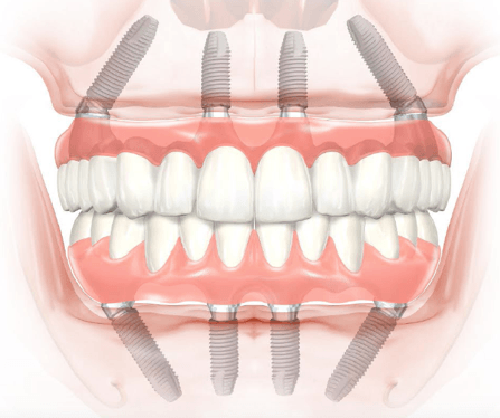
The All-on-4 or All-on-6 procedure is an alternative to bone grafting. The procedure angles the rear implants in the jawbone to help prevent displacement.
We recommend consulting a skilled implant dentist with post-graduate training in implantology. Otherwise, a dentist with implant denture experience can refer you to an oral surgeon. Ensure that you visit the dentist before the oral surgeon. They can coordinate your care so the dentist provides dentures that fit your mouth and bite. The surgeon will use a surgical guide to place the implants based on the dentist’s plans for your denture placement. After an exam and CT scan, the surgeon will explain your implants and bone grafting options.
Your implant dentures will be stable and look and feel more like natural teeth.
Rocky Hill, CT, dentist Dr. Thaddeus Michalski sponsors this post.
My New Partial Denture Burns My Tongue
My tongue has been burning since I got a new partial denture last November. It burns beneath my tongue and on my lips. I also have bad taste. My dentist suspects a metal allergy and recommends a $4,500 bridge instead. He also gave me liquid lidocaine to numb my mouth. I know that’s not a solution, but I wanted to describe what’s happening completely. Is a dental bridge my only alternative? – Thank you. Sona from IL
Sona
You’re right. Liquid lidocaine is not a solution to the burning sensation on your tongue and lips. We are concerned with your dentist’s diagnosis and treatment options.
A skilled dentist knows the alternatives to a metal-based partial dentist. One option is the Valplast partial.
What Is a Valplast Partial Denture?
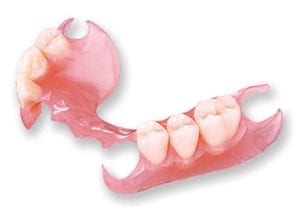
A Valplast partial denture is a denture with a thermoplastic resin framework. Thermoplastic resin is stronger and more flexible than acrylic. It may be a tooth replacement solution if you are allergic to metal-based dental restorations. Although we are unaware of allergic reactions to Valplast, it is not impossible to be allergic to it.
Ask your dentist whether you can benefit from a Valplast partial denture or another thermoplastic resin denture.
What If You’re Allergic to Your Partial Denture?
If you suspect a reaction to your partial denture, we recommend testing from an allergist. Ask your dentist about the metal content of your existing denture and the contents of alternative partial dentures, including acrylic. Nickel in dental materials is the most common allergen. Test results from the allergist can help you find a biocompatible solution.
If your dentist cannot recommend a non-metal partial denture, schedule a second opinion with an advanced cosmetic dentist to discuss your options. A dental bridge should not be necessary. Also, a bridge requires work on teeth adjacent to the missing one. Although it costs more, a dental implant is a healthier, long-lasting solution for a missing tooth. Nevertheless, a cosmetic dentist can explain your tooth replacement options after allergy testing.
Dr. Thaddeus Michalski, a Rocky Hill, Connecticut dentist and Diplomate of the International Congress of Oral Implantologists, sponsors this post.
Why Do My New Dental Crowns Still Hurt?
In September, I had two upper left crowns replaced. I wore temporary crowns for almost four weeks while waiting for the final one. As I wore the temporary crowns, they started to smell, leave a bitter taste in my mouth, and become painful. My dentist said that the new crowns would resolve the issues. The pain increased after I received my final crowns. When I returned to the dentist, he said my bite was probably off. He drilled to correct my bite, but now that pain comes and goes. It hurts to chew and bite down on the left side of my mouth. I am afraid that I have tooth infections and will need dental implants if I continue to let my dentist experiment on my teeth. What can I do? Thanks. Oakley
Oakley,
Almost four weeks is a long time to wear temporary crowns. We understand that your experience is frustrating. Although you need an exam and X-ray to determine the cause of your discomfort, we will discuss some causes of problems with temporary and permanent crowns.
Pain and Odor with Temporary Crowns
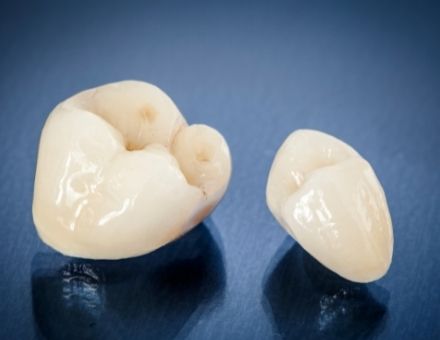
If your temporary crowns begin to smell and hurt, microscopic particles are trapped between the crowns and your teeth and breed bacteria. The bacteria affect the dentin (the layer beneath tooth enamel) and irritate it. The tooth beneath a crown can begin to decay.
Why Do Your New Dental Crowns Hurt?
Dental cement that bonds a new crown can irritate your tooth. If a tooth is already sensitive, the sensitivity may temporarily increase but gradually decrease and go away. When sensitivity does not improve, the tooth may be infected. Your dentist might need to perform root canal treatment on the tooth.
Pain When Biting with a New Crown
If you feel pain when biting or chewing with a new crown, your dentist should adjust your bite until you are comfortable. Even tooth ligaments are sometimes irritated, and your dentist would need to x-ray the roots to see their condition.
If your dentist cannot resolve sensitivity with your new crowns, we recommend that you get a second opinion to prevent the need for dental implants.
Rocky Hill, Connecticut, cosmetic dentist Dr. Thaddeus Michalski sponsors this post.
Lidocaine Doesn’t Work and My Dental Implant Failed
My upper right first premolar cracked last month. My dentist said he couldn’t save the tooth, so he scheduled an appointment for an extraction and implant. Before and during the extraction, my dentist gave me six lidocaine shote. My palate and tongue burned. My dentist placed an implant right after removing the tooth. When I returned for a checkup the following week, I told the dentist about my burning palate and tongue, so he prescribed a mouth rinse. I had a four-month monthly checkup before my dentist said the bone was ready for my final crown. My mouth burned for all that time despite the mouth rinse. My dentist exposed the implant, and we waited a few more weeks for him to take impressions for my final crown. I thought I would be good to go when the crown arrived, and maybe all the burning could calm down.
I can’t explain the extent of my discomfort when the dentist tried to screw the crown onto the implants. This appointment was another round of six lidocaine shots. Finally, he got the crown on, but my bite felt off. Because of my stress, we scheduled two more appointments to correct my bite. It felt okay but not great before I went on vacation in late July. While on vacation, the crown fell off. I was so embarrassed to go to a dentist in Michigan. I found a competent dentist who has been placing implants for 20 years and is a co-instructor at dental implant classes for other dentists. What a relief. I wish I could go back to Michigan for care. Anyway, that dentist told me to see my local dentist right away. My dentist admitted that the implant failed and that he needed to remove it. I have no implant, just a missing tooth, and a burning tongue and palate. I told my dentist I wanted a refund, and he agreed but asked me to let him redo the work. He said that he now understands what went wrong. Why couldn’t he know before it went wrong? Anyway, I’m going to get a second opinion in two weeks. Any suggestions before my appointment? Thanks. Sandeep from PA
Sandeep,
We are sorry you’ve had such stressful dental experiences with the local anesthetic and dental implant failure. We will offer suggestions to help you get needed care.
What If Lidocaine at the Dentist Doesn’t Work?
If lidocaine at the dentist doesn’t work for you, resistance to local anesthesia or high anxiety levels can prevent a dentist from numbing the area. Talk to your dentist about sedation options to help you relax before your appointment. Sedation can also dull your pain sensitivity.
What Can You Do About Dental Implant Failure?
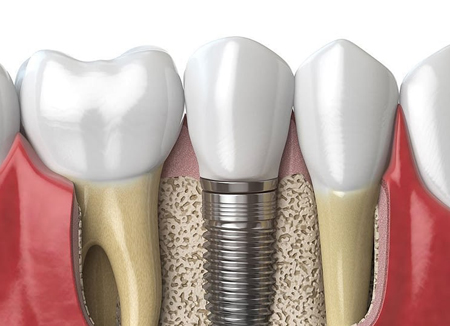
When a dental implant has failed, we recommend getting a second opinion from a skilled implant dentist. Look for a provider with post-graduate training in implantology. The dentist will need a 3D CT scan to help determine the cause of implant failure. Perhaps you need bone grafting to build up your jawbone, allowing it to support a dental implant.
If a dentist forced your temporary crown on the implant, the force may have contributed to dental implant failure. If your dentist continues cooperating, you can request a refund.
Although the cause of burning mouth syndrome is unknown, many incidents relate to dental trauma. When you find a gentle dentist who may use sedation to relax you during your visit, your burning mouth will likely calm down. Otherwise, speak with your new dentist about your concerns.
Rocky Hill, Connecticut, cosmetic dentist Dr. Thaddeus Michalski sponsors this post.
Do I Need a Tooth Root Removed That Broke During Extraction?
When my dentist removed my upper left first molar, part of the tooth root broke off. My dentist referred me to an oral surgeon to remove the root. Is there any harm in leaving the root in the socket? How common is this, anyway? I’m a little frustrated that my dentist could have referred me to a surgeon in the first place. He wounded so confident about the extraction that I trusted him. Thanks. Leander from S. Dakota
Leander,
Part of a tooth root may break during tooth removal because of the root shape or challenges removing the tooth; it is not uncommon. If a dentist realizes a root fragment is left, they may refer you to a specialist. Other dentists use an X-ray to anticipate the complexities of extraction and may refer you to a specialist upfront for tooth removal.
Do You Need to Remove a First Molar Tooth Root?
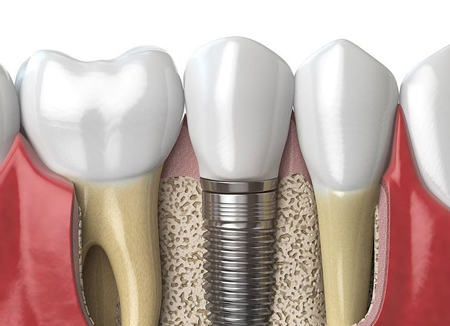
If a dentist leaves a tooth root behind after extracting an upper first molar tooth, the root can poke the sinus, resulting in sinus perforation. Leaving the tooth root in the socket for months increases complications and risks. Sinus perforation surgery can be complex and requires the skill of a specialist.
We recommend getting a second opinion right away. If the tooth root is too close to the sinus wall, a specialist may decide to leave it. Otherwise, the surgeon will remove it promptly.
If you are considering a dental implant to replace the missing first molar tooth, talk to the surgeon about it. Depending on the condition of the tooth socket and your sinus, the surgeon may recommend a bone graft or sinus augmentation procedure to prepare the site for an implant. A dental implant needs enough quality bone to support an implant crown. Caring for the socket now can prevent the need for another surgery later if appropriate. Ask the specialist about your options.
Dr. Thaddeus Michalski, a Rocky Hill, Connecticut dentist and Diplomate of the International Congress of Oral Implantologist, sponsors this post.
See a Dentist or Oral Surgeon for Dentures and Implants?
Should I see a dentist or oral surgeon for immediate dentures and implants? I lost most of my teeth to gum disease and agreed with my dentist that extractions are best for the few remaining teeth. My dentist showed me 10 to 12 pictures of her patients’ dentures, but I don’t like how they look. I will switch dentists, but I wonder if I should see a dentist or oral surgeon first. My mouth is in such bad shape that I want to get this done as soon as possible, so the thought of immediate dentures makes sense. I would like to have this behind me by early fall. Thanks. Curtis
Curtis,
Should You See a Dentist or Oral Surgeon for Implant Dentures?
If you want implant dentures, we recommend searching for a dentist with advanced implant training who can remove your remaining teeth, place dental implants, and restore the implants with a custom denture. Teeth-in-a-Day and All-on-4 dental implants are fixed implant overdentures. You can get all the treatment you need in one location from one provider, eliminating miscommunication between an oral surgeon and restoring dentist who provides the denture.
However, completing your smile and preserving your oral health will take time. Avoid looking for a dentist who promises to meet your timeline rather than doing what’s best for your oral health and quality of life.
What Is an Immediate Denture?
An immediate denture is a removable denture for an entire arch of missing teeth. A dentist places the denture on the same day as tooth extractions. Still, before agreeing to any treatment, we recommend consulting with a periodontist (gum disease specialist) or a dentist with periodontal training to ensure your gums are healthy. However, you mentioned that you also want dental implants. So, the process will be different.
How Long Does It Take to Get Implant Dentures?

Getting implant dentures takes six months to a year, even longer if you need gum disease treatment first. If you qualify for dental implants, you may be interested in Teeth-in-a-Day or All-on-4 dental implants. You can get dental implants and temporary dentures in one visit. Your dentist will provide a custom final denture after your implant heal.
However, before you get implant dentures, a dentist will examine your mouth and take X-rays and a 3D CT scan to determine the following:
- Your gum health and whether you need periodontal treatment
- Your jawbone quality and volume
- Whether you need bone grafting before dentures and implants
The treatment you get from an implant dentist depends on your medal and dental history and the status of your oral health.
Schedule a consultation with a dentist with advanced implant training to get high-quality implant overdentures, including All-on-4 dental implants. The dentist will explain your treatment options for dentures and dental implants.
Dr. Thaddeus Michalski, a Rocky Hill, Connecticut dentist and Diplomate of the International Congress of Oral Implantologist, sponsors this post. He serves Hartford, Connecticut, and surrounding communities.
Will I Need a Tooth Implant If My Dental Crown Fractured?
One of my four porcelain crowns cracked, and I would like to know if it is an emergency and whether I will need a tooth implant. The tooth is my left lateral incisor; I’ve had a crown on it since 2002. I do not want to jeopardize my tooth and need a dental implant. The fracture is near the bottom. I took pictures of the crack when I first noticed it, and it’s more noticeable than it was a few months ago. I do not want it to break while I am out of town visiting my mom for two weeks. The other issue is that I have a new dentist whom I have only seen for cleanings and exams. I’m unsure if I want this practice to do any cosmetic work on my teeth. Is my fractured crown an emergency? – Thank you. Ellis from MI
Ellis,
Thank you for your question.
Is a Fractured Dental Crown an Emergency?
A fractured crown is not an emergency that immediately jeopardizes your tooth. Thin fractures (craze lines) in teeth or crowns usually affect only the tooth enamel. However, if you can see the fracture and it is more visible than before, it may worsen. And the crown will eventually break completely.
Do You Need a Tooth Implant if a Crown Breaks?

You do not automatically need a tooth implant if a crown breaks. However, if you leave the tooth unprotected for an extended period, your natural tooth might weaken and break. A cosmetic dentist will examine and x-ray your tooth and look for any signs of damage. Unless you experienced trauma or internal damage to the tooth and the tooth is unsavable, you don’t need a tooth implant.
Get a Dental Crown Second Opinion
You are wise not to trust a dentist whose cosmetic work you haven’t experienced or seen. We recommend scheduling an appointment with an advanced cosmetic dentist to replace the crown. If you are concerned about the crown while out of town, consider seeing a cosmetic dentist as soon as possible. It usually takes about two weeks to get a new crown.
Replacing one crown requires a dentist to have the color-matching skill to ensure the replacement matches your natural teeth and other crowns. Color-matching is a challenge for many dentists, who seldom admit when they do not have the skill.
If you must delay a dental visit and anything happens to your crown while out of town, look for an accredited cosmetic dentist or one with advanced cosmetic dentistry training. Look at dentists’ websites for a smile gallery of before-and-after photos of crowns on front teeth. You can prevent the need for a tooth implant by getting an experienced dentist to examine the condition of your crown and tooth promptly.
Dr. Thaddeus Michalski, a Rocky Hill, Connecticut dentist and Diplomate of the International Congress of Oral Implantologist, sponsors this post. Read how Dr. Michalski strives to provide patients with some of the best dental care in Rocky Hill.
How Can I Get a Refund from My Dentist?

What Is the National Practitioner Data Bank?
The National Practitioner Data Bank (NPDB) is a database that the U.S. Department of Health and Human Services operates. It contains records of medical malpractice payments and adverse action reports on health care providers. A dentist must report refunds to the NPDB for requests that patients submit in writing or that the dental practice’s account pays. Dentists want to avoid having records of their refunds in the NPDB.
How Can You Ask for a Refund?
You ask for a refund from your dentist with a direct verbal request. Remember, refunds from patients’ verbal requests do not require dentists to notify the NPDB. So, if your dentist hesitates to refund you, you can remind them that your request is verbal and does not require reporting to the NPDB. You might say, “I prefer not to make a written request or hire a lawyer to get a refund. Can we keep it simple?” Your conversation may prompt your dentist to refund you so that they can avoid having the refund recorded in the NPDB database.
For additional information on how to talk with your dentist about problems with their work, please refer to the Problems with Your Dentist page from the American Dental Association.
How Can You Minimize the Risks of Needing a Refund?
Any dentist can make a mistake. But you can minimize the risks of negligence or faulty dental work with these steps:
- Ask friends or family members for recommendations.
- Check patients’ reviews online.
- Look at dentists’ websites for their credentials and experience.
For example, if you want porcelain veneers, look for a dentist with post-graduate training and experience in cosmetic dentistry. For replacing missing teeth, look for a dentist with dental implant credentials. You can schedule consultations with at least two dentists, discuss your concerns, and ask to see their patients before and after photos of cases like yours.
Dr. Thaddeus Michalski of Rocky Hill, Connecticut, sponsors this page. Read about what Dr. Michalski does to provide patients with some of the best dental care in Rocky Hill.
Dental Implant Delay Because a Sinus Perforation Won’t Heal
A sinus perforation after a second molar extraction is not healing. I wanted to schedule a consultation for a dental implant and probably a bone graft in June, but the perforation will not heal. My dentist asked me to be patient, but it’s been five months. How long should I wait before getting a second opinion? Thank you. Kasia
Kasia,
Thank you for contacting Radiant Smiles of Rocky Hill regarding a sinus perforation and delay in getting a dental implant.
How Long Does It Take for a Sinus Perforation to Heal?
Five months is enough time for mild to moderate sinus perforation to heal. Large perforations can take longer. Feel free to get a second opinion whenever you want. Although a sinus perforation does not necessarily mean that a dentist or oral surgeon was negligent, the dental professional who removed your tooth should take responsibility for giving you follow-up care and ensuring your recovery is as smooth as possible.
Why Would a Sinus Perforation Occur?
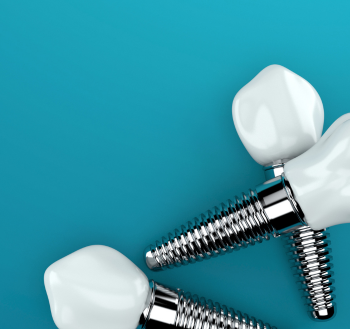
A sinus perforation may occur when a thin layer of bone or membrane separates tooth roots from the sinus. Has your dentist or oral surgeon attempted to close the opening? We recommend asking for a referral to an oral surgeon or seeking a second opinion on your own.
An unhealed perforation will delay your dental implant treatment because a dental implant requires the following:
- Healthy bone to support the implant
- Healthy gum tissue to heal around the implant
- Stabile environment to help a dental crown on the implants
Getting a Dental Implant After a Sinus Perforation
You can expect a highly trained implant dentist or oral surgeon to assess and repair your sinus perforation. A sinus augmentation or bone graft will ensure your dental implant has a healthy foundation that will integrate with the implant.
Request a consultation or second opinion promptly to repair the tear and promote healing.
Dr. Thaddeus Michalski, a Rocky Hill, Connecticut dentist and Diplomate of the International Congress of Oral Implantologist, sponsors this post.
7 Months Pregnant. Is It Safe to See a Dentist for a Toothache?
I am 7 months pregnant. I have a cap on a right molar tooth that cracked three years ago. The tooth has hurt on and off for two months. The pain is getting worse, and it’s stressing me a little bit because I’ve been planning to work up to the delivery, and it’s hard for me to get time off work to go to the dentist. I am not sure that it is even safe to see a dentist. Or should I let it go until after the delivery? Thanks. Gia
Gia – Thank you for contacting Radiant Smiles of Rocky Hill.
Can You See a Dentist If You’re Seven Months Pregnant?
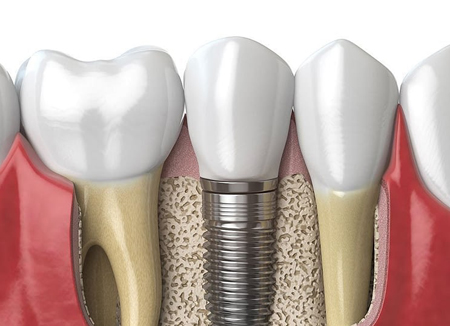
If you have a persistent toothache or trauma, see a dentist even if you are seven months pregnant. Your tooth is probably infected. A dentist must treat the infection, so it doesn’t worsen. It is even possible for a tooth infection to spread to other teeth, your jawbone, and in the worst case, into your bloodstream. Don’t put your baby at risk. See a dentist who accepts emergency cases as soon as possible. If the tooth dies, it will require removal and a dental implant—more costly and time-consuming treatment.
What Are the Guidelines for Dental Care During Pregnancy?
The guidelines for dental care during pregnancy are based on your trimester.
Before the third trimester
Before the third trimester, even regularly scheduled check-ups and exams are essential to prevent periodontal (gum) disease and for early detection and treatment of any oral health issues. Routine x-rays during these exams can usually be delayed until after the baby is born.
During the third trimester
During the third trimester of pregnancy, delay preventive dental care. Also, you can wait for electives and cosmetic dentistry until after the birth of your baby.
Although you should avoid routine x-rays during pregnancy, if an x-ray is required, the American College of Radiology reports that a single x-ray will not adversely affect an embryo or unborn fetus. Speak with your obstetrician and let them know you have a dental emergency. Be sure to let your dentist know your medical history and provide a list of all medications you currently take.
Dr. Thaddeus Michalski, a Rocky Hill, Connecticut dentist and Diplomate of the International Congress of Oral Implantologist, sponsors this post.


